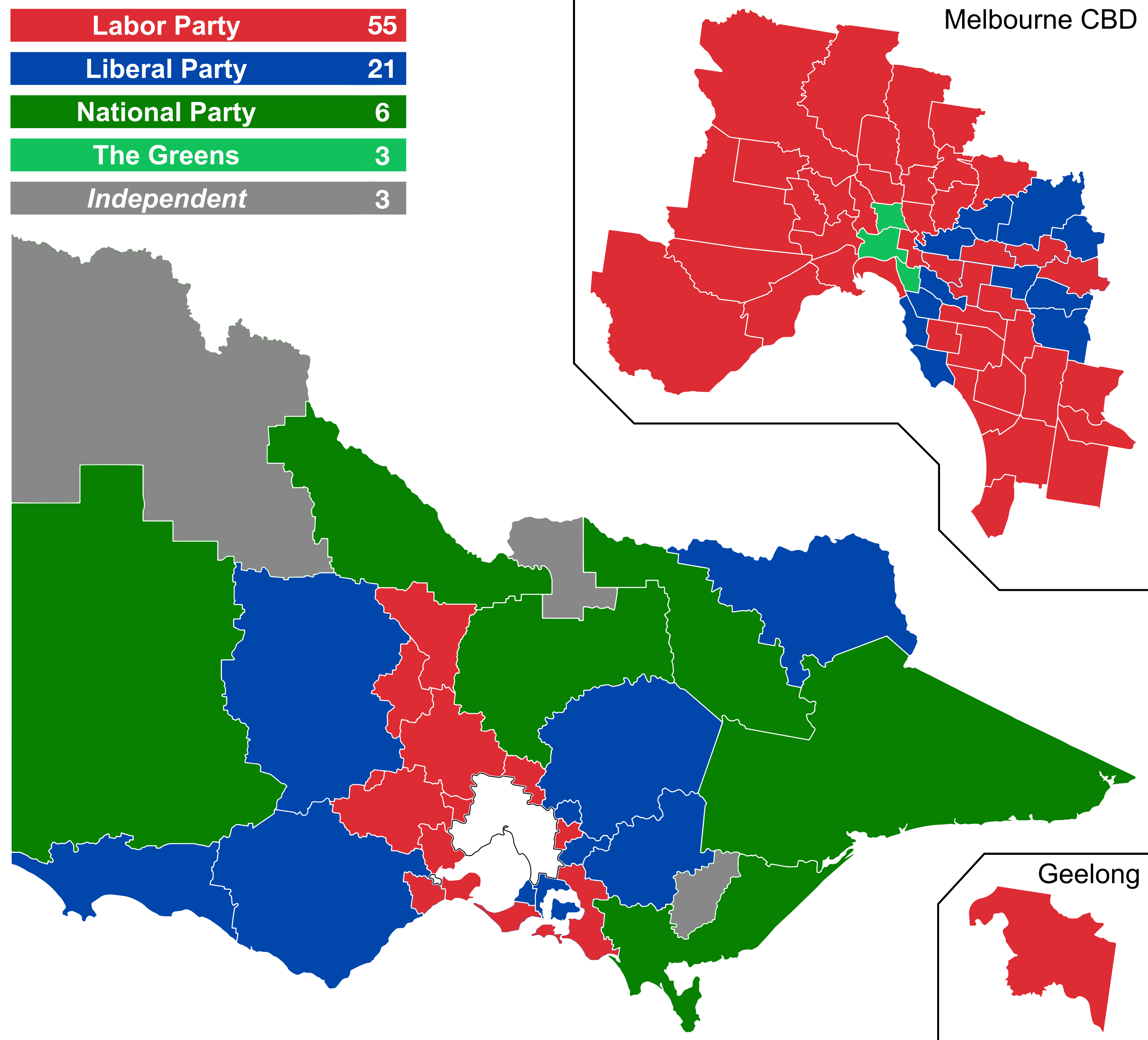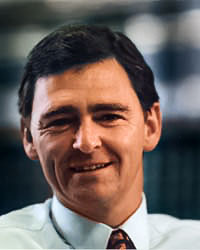|
Robert Clark (Australian Politician)
Robert William Clark (born 11 March 1957) is an Australian former politician. He was a Liberal Party member of the Victorian Legislative Assembly from 1988 to 2018, representing the electorates of Balwyn (1988–1992) and Box Hill (1992–2018). He served as Attorney-General and Minister for Finance in the Baillieu Ministry and Napthine Ministry from 2010 to 2014, and also served as Minister for Industrial Relations under Napthine from 2013 to 2014. He had previously served as Parliamentary Secretary to the Treasurer (1992–1996) and Parliamentary Secretary for Treasury and Multimedia (1996–1999) during the Kennett government. Early life Having attended both St. Albans High School and University High School, Clark undertook his tertiary education at the University of Melbourne, obtaining his BCom (Hons) in 1980, an LLB in 1982 and a BA in 1986. Student activism Whilst at university, Clark became active in both the Melbourne University Liberal Club and the Australi ... [...More Info...] [...Related Items...] OR: [Wikipedia] [Google] [Baidu] |
The Honourable
''The Honourable'' (Commonwealth English) or ''The Honorable'' (American English; American and British English spelling differences#-our, -or, see spelling differences) (abbreviation: ''Hon.'', ''Hon'ble'', or variations) is an honorific Style (manner of address), style that is used as a prefix before the names or titles of certain people, usually with official governmental or diplomatic positions. Use by governments International diplomacy In international diplomatic relations, representatives of foreign states are often styled as ''The Honourable''. Deputy chiefs of mission, , consuls-general, consuls and honorary consuls are always given the style. All heads of consular posts, whether they are honorary or career postholders, are accorded the style according to the State Department of the United States. However, the style ''Excellency'' instead of ''The Honourable'' is used for ambassadors and high commissioners only. Africa Democratic Republic of the Congo In the Democrati ... [...More Info...] [...Related Items...] OR: [Wikipedia] [Google] [Baidu] |
2018 Victorian State Election
The 2018 Victorian state election was held on Saturday, 24 November 2018 to elect the 59th Parliament of Victoria. All 88 seats in the Legislative Assembly (lower house) and all 40 seats in the Legislative Council (upper house) were up for election. The first-term incumbent Labor government, led by Premier Daniel Andrews, won a second four-year term, defeating the Liberal/ National Coalition opposition, led by Opposition Leader Matthew Guy in a landslide victory. The Greens, a minor party led by Samantha Ratnam also contested the election. Labor won 55 seats in the 88-seat Legislative Assembly, an increase of eight seats from the previous election in 2014, and a majority of 22 seats. This was the fifth time that a Labor government was re-elected in Victoria, and it tied Victorian Labor's second-best showing at the state level. The Coalition suffered an 11-seat swing against it, and won 27 seats. The Greens won 3 seats, a net increase of 1 seat since the last election though ... [...More Info...] [...Related Items...] OR: [Wikipedia] [Google] [Baidu] |
2014 Victorian State Election
The 2014 Victorian state election, held on Saturday, 29 November 2014, was for the 58th Parliament of Victoria. All 88 seats in the Victorian Legislative Assembly and 40 seats in the Victorian Legislative Council were up for election. The incumbent centre-right Coalition (Australia), Coalition minority government, led by Liberal Party of Australia (Victorian Division), Liberal Party leader and Premier of Victoria, Premier Denis Napthine and National Party of Australia – Victoria, National Party leader and Deputy Premier of Victoria, Deputy Premier Peter Ryan (politician), Peter Ryan, was defeated by the centre-left Australian Labor Party (Victorian Branch), Labor Party opposition, led by Daniel Andrews. Australian Greens Victoria, The Greens won two lower house seats, their first Legislative Assembly seats in a Victorian state election, whilst increasing their share of upper house seats. The new First Andrews ministry, Andrews Ministry was sworn in on 4 December 2014. Voting i ... [...More Info...] [...Related Items...] OR: [Wikipedia] [Google] [Baidu] |
Department Of Justice (Victoria)
The Department of Justice and Community Safety (DJCS) is one of nine government departments in the state of Victoria, Australia. Known as the Department of Justice and Regulation until January 2019, it manages and provides government services relating to Victoria's justice system. Ministers , the DJCS supports four ministers in the following portfolios: Functions The DJCS has responsibility for the following policy areas: * Legal system * Courts and tribunals * Policing * Business licensing * Corrections, prisons and parole * Human rights and anti-discrimination law * Emergency services * Births, deaths and marriages * Emergency management * Consumer affairs * Workplace safety * Gambling and alcohol regulation Agencies Agencies under the DJCS portfolios include: References External links * {{Government departments of Victoria Justice Victoria Victoria most commonly refers to: * Queen Victoria (1819–1901), Queen of the United Kingdom and Empress of India * ... [...More Info...] [...Related Items...] OR: [Wikipedia] [Google] [Baidu] |
2010 Victorian State Election
The 2010 Victorian state election, held on Saturday, 27 November 2010, was for the 57th Parliament of Victoria. The election was to elect all 88 members of the Legislative Assembly and all 40 members of the Legislative Council. The incumbent centre-left Labor Party government, led by John Brumby, was defeated by the centre-right Liberal/ National Coalition opposition, led by Ted Baillieu. The election gave the Coalition a one-seat majority in both houses of parliament. Voting is compulsory in Victoria. Elections for the Legislative Assembly use instant-runoff voting (called preferential voting in Australia) in single-member electorates (called districts). Elections for the Legislative Council use partial proportional representation, using single transferable vote (also called preferential voting) in multi-member electorates (called regions). Members of the Legislative Council are elected from eight electoral regions each returning five members, making the quota for ... [...More Info...] [...Related Items...] OR: [Wikipedia] [Google] [Baidu] |
Coalition (Australia)
A coalition is formed when two or more people or groups temporarily work together to achieve a common goal. The term is most frequently used to denote a formation of power in political, military, or economic spaces. Formation According to ''A Guide for Political Parties'' published by the National Democratic Institute and the Oslo Center for Peace and Human Rights, there are five steps to coalition building. The first step in coalition building involves ''developing a party strategy'' that will prepare for successful negotiation. The more effort parties place on this step, the more likely they are to identify strategic partners, negotiate a good deal and avoid some of the common mistakes associated with coalition building. The second step is ''negotiating a coalition''. Based on the strategy that each party has prepared, the parties come together to negotiate and reach an agreement on the coalition terms. Depending on the context and objectives of the coalition, these negotia ... [...More Info...] [...Related Items...] OR: [Wikipedia] [Google] [Baidu] |
1996 Victorian State Election
The 1996 Victorian state election, held on Saturday, 30 March 1996, was for the 53rd Parliament of Victoria. It was held in the Australian state of Victoria to elect all 88 members of the state's Legislative Assembly and 22 members of the 44-member Legislative Council. The election took place four weeks after the 1996 federal election which swept the Labor Party from power nationally. The Liberal–National Coalition led by Jeff Kennett and Pat McNamara was returned for a second term. A swing against the government did not produce a significant seat transfer to the Labor Party, now led by John Brumby and still recovering from its landslide defeat at the October 1992 state election. While Labor obtained significant swings in safe Coalition seats, the marginal outer suburban electorates swung further towards the government. The overall two party preferred swing was 2.8% to Labor. The first signs of rural discontent with the Kennett government began to appear at this electio ... [...More Info...] [...Related Items...] OR: [Wikipedia] [Google] [Baidu] |
Alan Stockdale
Alan Robert Stockdale (born 21 April 1945) is an Australian former politician who was the President of the Liberal Party of Australia from 2008 to 2014 and a former deputy leader of the Victorian Liberal Party. He represented the seat of Brighton in the Victorian Legislative Assembly from 1985 to 1999, and served as the Treasurer of Victoria in the government of Jeff Kennett from 1992 to 1999. Early life Having attended Melbourne High School during his secondary years, Stockdale undertook his tertiary education at the University of Melbourne, obtaining his LL.B. in 1967 followed by his B.A. in 1970. While at University, he was active within the Melbourne University Liberal Club, becoming president in 1965. He also chaired both the Melbourne University Debating Union and Melbourne University Debating Society, representing the University as an inter-varsity debating representative in 1966. Stockdale has been married three times. After a brief marriage to Deirdre O'Shea, he ma ... [...More Info...] [...Related Items...] OR: [Wikipedia] [Google] [Baidu] |
Liberal Party Of Australia
The Liberal Party of Australia (LP) is the prominent centre-right political party in Australia. It is considered one of the two major parties in Australian politics, the other being the Australian Labor Party (ALP). The Liberal Party was founded in 1944 as the successor to the United Australia Party. Historically the most electorally successful party in Australia's history, the Liberal Party is now in opposition at a federal level, although it presently holds government in the Northern Territory, Queensland and Tasmania at a sub-national level. The Liberal Party is the largest partner in a centre-right grouping known in Australian politics as the Coalition, accompanied by the regional-based National Party, which is typically focussed on issues pertinent to regional Australia. The Liberal Party last governed Australia, in coalition with the Nationals, between 2013 and 2022, forming the Abbott (2013–2015), Turnbull (2015–2018) and Morrison (2018–2022) governments ... [...More Info...] [...Related Items...] OR: [Wikipedia] [Google] [Baidu] |
Australian Union Of Students
The Australian Union of Students (AUS), formerly National Union of Australian University Students (NUAUS), was a representative body and lobby group for Australian university and college of advanced education students. It collapsed in 1984 and was succeeded by the National Union of Students in 1987. NUAUS The NUAUS formed in 1937 as a representative body for Australian university students. An early president (1940) of the NUAUS was Frank Coaldrake, who was also the founding editor of the pacifist newspaper '' The Peacemaker'', the Chairman of the Australian Board of Missions and, just before his death, the Archbishop-elect of Brisbane. John Bannon, who would later be elected the 39th Premier of South Australia, was President of NUAUS in 1968. AUS Australian Union of Students (AUS) was established in December 1970 as a successor to the NUAUS, changing its name to reflect the addition of colleges of advanced education to the tertiary education system in Australia. The 28 ... [...More Info...] [...Related Items...] OR: [Wikipedia] [Google] [Baidu] |
Australian Liberal Students' Federation
The Australian Liberal Students' Federation (ALSF) is an Australian students' political organisation. Founded in 1948, the ALSF carries similar ideology to the Liberal Party of Australia. The Federation works closely with the Liberal Party, however it is an independent organisation that pursues its own policy agenda. The Federation works to promote Liberal beliefs on campus, facilitates communication amongst individual clubs and assists in co-ordinating national Liberal Student campaigns. The ALSF is organised as a Federation with events, policy and elections taking place at a club level, as well as a federal executive and delegate system to elect a national executive, platform and strategic direction. The ALSF is a member of the International Young Democrat Union. Organisation The Federation was formed on the 26th of August 1948 in Melbourne with delegates representing University Liberal clubs from each state, with the exception of Queensland, meeting in a three-day conferenc ... [...More Info...] [...Related Items...] OR: [Wikipedia] [Google] [Baidu] |




